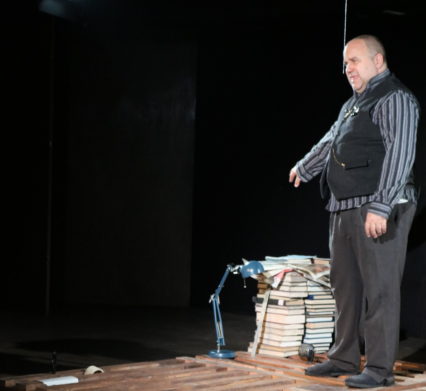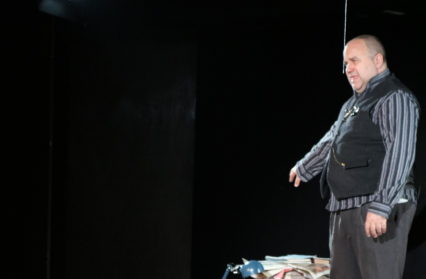Gary Raymond reports back from India where he saw the opening night of Living Pictures’ tour of India with Diary of Madman.
There is a peculiar muted energy in the room in the few hours of build up to an opening night, techs and others scurrying around making tweaks, snapping gaffer tape, taking stock one last time before it’s over to the players to bring it all together into a cogent whole. Most theatre-goers know very little (and probably care even less) of the work that goes in to a show in the days and hours before it presents, viewing each performance as existing not just aesthetically within the frame of the stage edges, but also temporally – the play is incased only before your eyes. The world of the play comes into life when the curtain goes up and it evaporates as we shuffle along the rows of seats and out the door. It may seem facetious, but if theatre is where magic happens then it is important to remember who the magicians are, and how many of them are at work.
 Diary of a Madman’s opening night comes out at the end of a quietly hurried process, and is received by a full house of enthusiastic festival-goers. Indian audiences have a reputation for being lush with willing, but here is an anomaly: it is not a “theatre audience”, but rather an audience from the Mumbai Literature Live festival, and so it is a little more rambunctious than normal. But this is a rambunctious play, and it is situations like this that really bring out some colours that may not be quite so obvious with the well-heeled and super-well-trained audiences back home. One thing becomes quite clear early on, that in an atmosphere of specked muttering and frequent mobile-phone ringtones, that Bowman is an actor – and Madman is a show – that sparks to challenges. Bowman tonight has fun because of the unfamiliar atmosphere, not in spite of it. Indian audiences – be them theatre regulars or just curious festival footfall – have a refreshing lack of cynicism, and a palpable lack of fear, the two most prominent and tiresome negatives to be found in the British breed. Bowman asks them to go on a journey with his Russian bureaucrat and the audience is eager to go with him through the soft ice blue light all the way to Madhouse Spain. Madman is here to learn as well as perform, and finding out how far you can push an audience is one of the reasons why an actor like Bowman takes to the stage in the first place.
Diary of a Madman’s opening night comes out at the end of a quietly hurried process, and is received by a full house of enthusiastic festival-goers. Indian audiences have a reputation for being lush with willing, but here is an anomaly: it is not a “theatre audience”, but rather an audience from the Mumbai Literature Live festival, and so it is a little more rambunctious than normal. But this is a rambunctious play, and it is situations like this that really bring out some colours that may not be quite so obvious with the well-heeled and super-well-trained audiences back home. One thing becomes quite clear early on, that in an atmosphere of specked muttering and frequent mobile-phone ringtones, that Bowman is an actor – and Madman is a show – that sparks to challenges. Bowman tonight has fun because of the unfamiliar atmosphere, not in spite of it. Indian audiences – be them theatre regulars or just curious festival footfall – have a refreshing lack of cynicism, and a palpable lack of fear, the two most prominent and tiresome negatives to be found in the British breed. Bowman asks them to go on a journey with his Russian bureaucrat and the audience is eager to go with him through the soft ice blue light all the way to Madhouse Spain. Madman is here to learn as well as perform, and finding out how far you can push an audience is one of the reasons why an actor like Bowman takes to the stage in the first place.
But also there has been a real anticipation of just how Madman would resonate with an Indian audience. The opening night gets a standing ovation, so things in the play hit marks. It is relatively simple to identify general universal themes in a play, but greatness comes with depth, not breadth, and nobody involved in Madman really knew how deeply it would go here. Without interviewing audience members, it is mainly supposition, but there is also something to be said for watching a play in the midst of a new crowd, and picking up on vibes. What Gogol’s story does, is it compresses the mundane world, the day to day, the office experience, makes it a realm of Munchausen-esque complexity where each step is an improbable inevitability. We are asked to believe that madness makes us willing as well as free, and there is a risky suggestion by the end that Poprishchin might be better off mad in his fantasy than miserable licking the boots of his masters. (If Madman is a tragedy – and it surely is – then it lies in the fact these are hi only two options).
There is an odd dignity in his ensuing degradation, that unbeknownst to him, his madness is a radical political statement. India is a place rife with street-level political debate, and here at Lit Live the audiences are here to sit and listen to thinkers, they are here to debate and challenge. AC Grayling is here, Phillipe Sands, Meg Rosoff, Francine Prose, as well as a litany of rock stars of Indian public discourse. The politics of Madman cannot be missed here. You have to ask if audiences at home are quite so attuned, even with the heated – and largely vapid – state of public debate. At these kinds of festivals a great deal of hot air is blown out on stage, and it is in the coffee houses and college lawns that real things are said, where the poise and ego of the professional circuit debater is no longer and ingredient. It is important to remember that in India, as with many places around the world that the UK does not understand, mastery of economics and finance is not about greed being good, but is about empowerment. Diary of a Madman perhaps has a more significant role to play here than it does in the country that still fetishises bureaucracy.
You can keep track of the Living Pictures tour of India here.



 Enjoyed this article? Support our writers directly by buying them a coffee and clicking this link.
Enjoyed this article? Support our writers directly by buying them a coffee and clicking this link.








